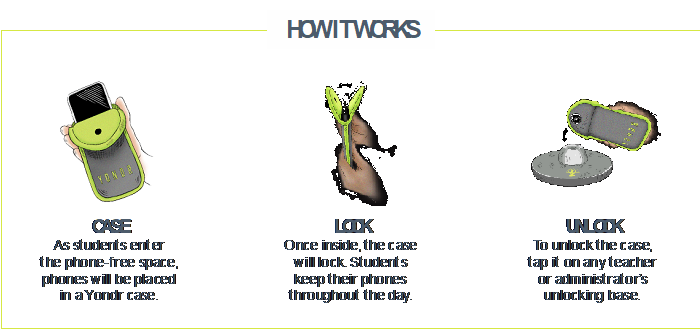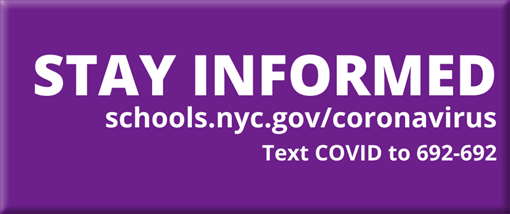Cell Phone Policy
Cell Phone/Electronic Device Policy K-8
Section 1
In accordance with New York City Department of Education (NYCDOE) Chancellor’s Regulation A-413, students are permitted to bring the following electronic items to school: 1) cell phones; 2) laptops, tablets, iPads and other similar computing devices (“computing devices”); and 3) portable music and entertainment systems (such as iPods, MP3 players, PSP and Nintendo DS) [The aforementioned items will be referred to as “devices” for the purposes of this policy.
Section 2
Although students are permitted to bring these devices to school, these devices may NOT:
a) be turned on or used during the administration of any school quiz, test or examination (this includes all P.S./I.S. tests and all New York State Education Department and NYCDOE exams). These devices can be used if they have been explicitly authorized by the school or are contained in an Individualized Education Program or Section 504 Accommodation Plan.
b) be turned on or used during school fire drills or other emergency preparedness exercises.
c) be used in gymnasium, hallways, offices, and bathrooms.
In accordance with Chancellor Regulation A-413, principals have the authority to determine the circumstances under which cell phones, computing devices, and portable music and entertainment systems may be used on school property and the procedures for confiscation, storage and return of such items.
Section 3 • P.S./I.S. 218 Cell Phone/Electronic Device Policy:
- Upon entering the P.S./I.S. 218 building, all P.S./I.S. 218 students must place their devices in their bookbags. Students can secure their devices in their bookbags, K-5, and grades 6-8 in their pouches. These devices should not be visible if students choose to carry them on their person (in their pockets, for example) throughout the school day.
- While on school premises or during any P.S./I.S. 218/NYCDOE sponsored activity outside of the P.S./I.S. 218 building (on a bus during a field trip, for example), students may not take out and/or use their devices (except for those devices they have been explicitly authorized to use according to their Individualized Education Program or Section 504 Accommodation Plan).
- Students who violate the P.S./I.S. 218 Cell Phone/Electronic device policy or who use these devices in violation of any provision of the DOE’s Discipline Code, the school’s policy, Chancellor Regulation A-413, and/or the DOE’s Internet Acceptable Use and Safety Policy (“ISUSP”) will be subject to discipline in accordance with the guidance interventions and disciplinary responses set forth in the NYCDOE Discipline Code.
Section 4 • Confiscation of Cell Phones/Electronic Devices Policy at P.S./I.S. 218:
- Students who violate the P.S./I.S. 218 Cell Phone/Electronic Device policy as outlined above or who use these devices in violation of any provision of the DOE’s Discipline Code, Chancellor Regulation A-413, and/or the DOE’s Internet Acceptable Use and Safety Policy (“ISUSP”) may have these devices confiscated by all P.S./I.S. 218 Educators, who act as designees of the principal.
- If students refuse to comply with directives instructing them to hand over their devices, staff members should notify an P.S./I.S. 218 administrator, or principal designees. This incident should be documented as a referral or as an anecdotal in Skedula. After students refuse to hand over their devices to P.S./I.S. 218 Educators, school staff may not engage in any verbal confrontations with students or attempt to confiscate the device from a student who is uncooperative or defiant.
- Once the device has been confiscated, it will be secured in a locked desk in an envelope (labeled with the student’s name/OSIS number, date of confiscation and type of device) in the locked office of an P.S./I.S. 218 administrator. The student’s parent or guardian will be notified and told the procedures for having the device returned.
- The first and all subsequent confiscations of a student’s device will result in the device being returned to the parent following a parent conference, in which the parent/guardian must report to P.S./I.S. 218 for the conference and to receive the device. The parent/guardian will be reminded of the P.S./I.S. 218 Cell Phone/Electronic Device policy.
Middle School Cell Phone Policy
Intermediate School 218 is writing to share the exciting news that we are partnering with Yondr to make our school a phone-free space.
We understand that cell phones have great utility, but cell phone use has increasingly become a source of distraction, antisocial behavior and conflict both at home and at school.
Intermediate School 218 believes in maintaining a safe and effective educational environment for all of its students. Research shows that the mere presence of cellphones in the classroom can be detrimental to student performance. According to a survey and report from Common Sense Media that involved 1,240 interviews with parents and their 12 to 18-year-old children, 50% of teens feel attached to their mobile devices, and 59% of their parents agree that their kids have a problem putting their devices down (U.S. News & World Report).
Yondr is currently used across the world in hundreds of classrooms and schools, at concerts, comedy shows, weddings and special events of all kinds. The goal of these spaces is to encourage people to engage with each other and their surroundings.
The Yondr program employs a simple, easy-to-use case that stores a cell phone and requires an unlocking base to open. When students arrive to school, they will place their phone in a Yondr case which is then locked. Students maintain possession of their phones but will not be able to use them until they are unlocked at the end of the day.
We believe this will allow our students to be:
- Engaged in classroom activities and assignments
- Less dependent on electronics to do classwork
- Less likely to engage in conversations around bullying
- Less likely to be distracted and procrastinate on assignments in class
Thank you for your continued support in ensuring a safe and healthy learning environment for our students. If you have any questions, please do not hesitate to contact Mrs. Núñez.
Sincerely,
Mrs. Núñez-AP
Cc: Principal

Frequently Asked Questions
What if I want to reach my student during the school day?
We want our students to be engaged in their learning. Please refrain from contacting your student during the school day unless it is an emergency. Please contact the main office at 718-410-7230 or 917-825-5578 Mrs. Núñez-Assistant Principal to reach your student.
What if there is an emergency?
In case of an emergency, we direct our students to safety first. School staff will be able to unlock a Yondr case in a matter of seconds for students once they are in a safe and secure location.
Will my student’s phone be safe?
Yes, because students are in possession of their phone in the Yondr case and should keep the case stored away in their backpacks.
What if the case gets damaged?
If a student damages or loses their Yondr case, they will be required to submit their phone to a school administrator immediately. The Yondr case is the property of the Intermediate School 218. Any damage to or loss of school property will result in a replacement charge of $20.


